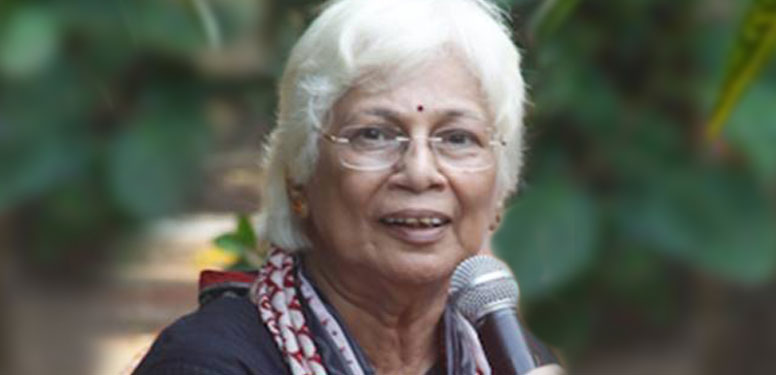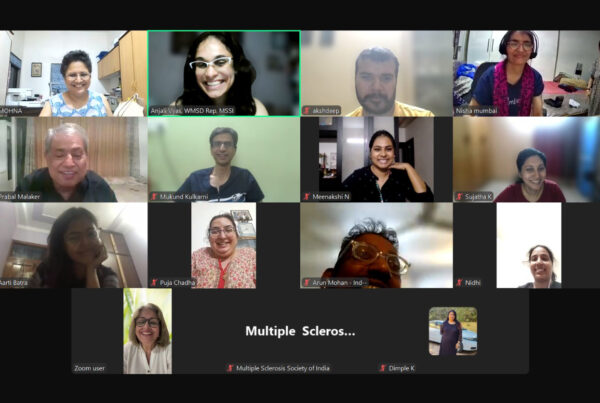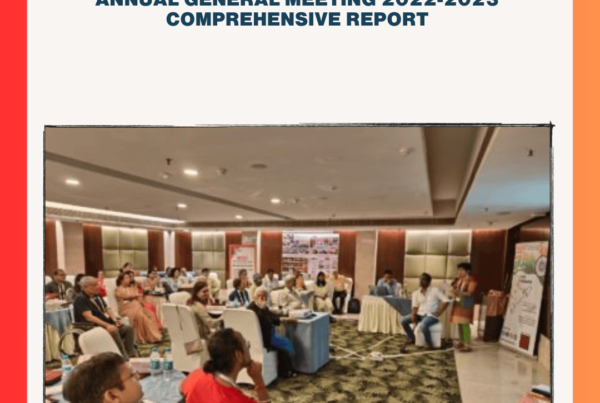
“How could you drop our baby on the floor like this? Why could you not be more careful, is it that you are jealous of him?” Such events started occurring more frequently. Everyday my anger was increasing as I was getting more and more puzzled with the behaviour of my husband.
Let me tell you about my harrowing experiences and the mental tensions that I went through during the first 20 years of my married life. I was fighting all odds with the moral support of only my parents, brother and a few friends. The fight is not only against the disease but mainly with the society which fails to acknowledge the illness and its effects on patients and their families.
In 1963 I got married at the age of 20 and Mukund was 29, we left our hometown Bombay and went to live in Calcutta where my husband was working in a government office as a Textile Chemist. Initially I did not notice anything amiss but soon things started going wrong. He just could not help around the house, without being clumsy and I thought he was doing it purposely to shirk domestic responsibilities. Unknown to me he was having problems in his office too and also started picking quarrels with me without any reason. I was so unhappy and there was no one in that strange city in whom I could confide. Then came his first serious illness in 1967. He was hospitalized for a long time without proper diagnosis, recovering only after about 4 months of sickness However, problems in office continued due to inability to handle his job.
Ultimately in 1969 we returned to Bombay and he changed his job. I was much relieved to be back in familiar surroundings but very soon the same behaviour problems returned. I never understood why he was under such continuous tension, causing so much irritation. I was pained and hurt and our marriage seemed to be on the rocks. Even though he was well qualified he could not prove his skills at work and as a result his earning capacity never increased. In January 1977, he had a second major illness and various types of treatments were tried again. During this attack he had lost the ability to walk and was totally bedridden till May 1977.
At last in May on the advice of his office doctor we consulted Dr. N.H. Wadia. He diagnosed the disease as Multiple Sclerosis, which made no sense to us, at that time, as we had never heard of it. Dr. Wadia told us that it was a rare disease in India, but it was quite common in western countries. I thought he might have got it when he was studying in Europe. I was shattered by the circumstances and with one of my Doctor friends’ advice I joined British Council Library and started reading books about MS, in earnest. This helped me tremendously to understand the disease and recognize the turmoil my husband was going through, as I started understanding him better.
By that time his mobility was further affected. It was very difficult for him to commute daily to his factory – 1 ½ hour journey by local train. In crowds he suffered frequent falls, to add, his disability was not visible. If people see a blind person or other visible disabilities they are considerate and careful but for my husband who till then looked the picture of health, nobody in that jostling crowd realized his need for help. When I approached his Superiors at work, for his transfer to a branch near our home, they flatly refused. They, like the jostling train crowds, did not realize that he was handicapped, a person who required special consideration. If he could not travel to the factory then he should resign, we were told. How could we possibly live without a job when our son was still at school and I was then just a housewife and we needed the income for our existence? With sheer will power my husband continued his daily travel to the factory, but I was worried at home till his safe return.
Again it was Dr. Wadia, who suggested I meet Mrs. Rehmut Fazelbhoy, a well-known Social Worker, who could help us. Mr. Tobaccowala, Chairman of Voltas, who was keen to start Services for Multiple Sclerosis in India, had called a meeting with Neurologists and a renowned Social Worker Rehmut, where Dr. Wadia had met her.
It was the turning point in my life, when I met Rehmut Fazelbhoy in 1984. First time I had met a stranger to whom I could pour out my pent up feelings, problems and fears. This was the day our Organization started functioning with my husband as the first MS Patient. With so much experience as a renowned Social worker in the field of Blind welfare, Mrs. Fazelbhoy convinced my husband’s employers easily about the need for his transfer to a nearby branch and within a week the orders were passed. This was the first instance of experiencing the strength of the Institution behind the needy people.
Now my husband and I were both motivated to take an active interest to help with forming a Society which could give assistance to other MS persons. I offered my services as a Jt. Hon. Secretary with Mrs. Fazelbhoy as Hon Secretary and together we worked on the Constitution in accordance with Government requirements. Late Mr Keki Randeria, father of Cawsi, a second MSPerson to join the MS Movement, helped us a lot in this task.
It was a happy day, when on July 26 1985 – the MSSI, with 3 MS Persons, was formally registered in Mumbai with the State Government as a Charitable Society. Ever since, we have grown multifold, into a strong Oak Tree with sturdy branches, giving respite in our shade, spreading branches all over, India – Benagluru Chennai,Delhi, Hyderabad, Kolkata, Mumbai Pune. We are a dedicated work-force, striving to do our best to improve the quality of life for persons suffering with Multiple Sclerosis. Then gradually over the years, we have introduced many useful Projects which are undertaken at every branch.
Since this crippler disease starts in young adulthood and is not a killer, the patient lives a normal span of life but most of them slowly become more and more disabled and ultimately may become bedridden. So the whole family of the MS patient gets affected financially, physically and emotionally for many years.
Hence, try to lighten some of their burden by providing various Services such as Counselling, Home Physiotherapy, Home Nursing, Home help for Caregivers, Medical Reimbursements, Aids and Equipments etc. We also help the Patients to get Disability Certificates, which enable them to avail of several benefits offered by the Govt. to the disabled. In addition, we also organize – Free Medical Camps, Seminars and Workshops, Recreational Programmes for Patients and their Families. Now our Visionary Project on the anvil is to start a Rehabilitation cum Respite Centre, bringing about transitory relief to both the patient and the stressed caregiver. This is the need of the time.
In India for other Disabilities, there are many Institutions who have got sufficient resources because people know of them, but the general public are mostly unaware of Multiple Sclerosis and its effects. So continuous awareness is most necessary.
When we read about the facilities offered to MS and other ‘challenged persons’ in Western countries, I wish we could provide ours with the same and of course we will try our best, because we must never give up hope. Still many Public Buildings do not have Elevators Hand Railings or Ramps. Public Toilets for Disabled are nearly non – existent, as also in the field of Public Transport there are no special facilities for disabled. Hence, mobility is severely affected and they become unnecessarily and unnaturally home bound, and ultimately social outcastes. Therefore, I strongly feel we must take on campaigns to create Public Awareness about the difficulties faced by MS and all such Disabled Persons.
I wish to personally Thank, each and every person associated with the MSSI – at any point in time, for lending a hand in making my – Dream come True!
-Ms. Sheela Chitnis


